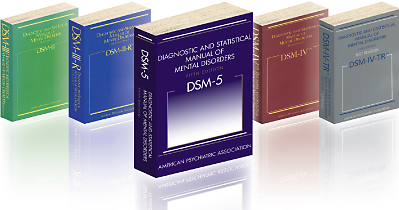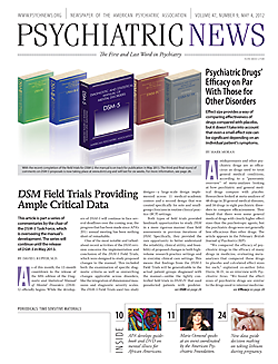As of this month, the 12-month countdown to the release of the fifth edition of the Diagnostic and Statistical Manual of Mental Disorders (DSM-5) officially begins. While the developers of DSM-5 will continue to face several deadlines over the coming year, the progress that has been made since APA’s 2011 annual meeting has been nothing short of remarkable.
One of the most notable and talked-about recent activities of the DSM revision concerns the implementation and conclusion of the DSM-5 Field Trials, which were designed to study proposed changes to the manual. This included both the examination of specific diagnostic criteria as well as overarching changes applicable across disorders, like the integration of dimensional measures and diagnostic severity scales. The DSM-5 Field Trials used two study designs—a large-scale design implemented across 11 medical-academic centers and a second design that was created specifically for solo and small-group clinicians in routine clinical practice (RCP) settings.
Both types of field trials provided landmark opportunities to study DSM in a more rigorous manner than field assessments in previous iterations of DSM. Specifically, they provided the rare opportunity to better understand the reliability, clinical utility, and feasibility of proposed changes in both high-volume research-practice settings and in everyday clinical care settings. This means that findings from the DSM-5 Field Trials will be generalizable to the actual patient groups diagnosed with the manual—unlike the tightly controlled field trials in DSM-IV that used preselected patients with predetermined diagnoses. Recruiting actual clinicians and patients, rather than relying on DSM Task Force members as participants, also reduces our chances of having biased findings.
Additionally, we examined the proposed changes to DSM among a wide variety of populations, varying in age, diagnosis, and ethnic background. And diagnostic interviews were conducted not just by psychiatrists but psychologists, counselors, psychiatric nurses, and family and marriage therapists; this is particularly important given the range of users who will use DSM-5 in their daily care of patients. These diagnostic interviews were not conducted using structured interviews. Rather, we wanted clinicians to assess patients as they normally would, again increasing the generalizability of results and helping us better understand how DSM-5 might perform out in the “real world.” We anticipate that findings from the DSM-5 Field Trials will help address questions from the 13 work groups about their proposed revisions, such as whether the criteria are reliable and understandable.
While the field trials were under way, another significant activity in DSM-5 development was simultaneously unfolding: text production. Work group members spent much of last summer and fall drafting their initial text for their diagnostic chapters and are now refining their chapters into second drafts. At the February meeting of the DSM-5 Task Force, the members were provided with a compendium of all available draft chapters, giving leadership the chance to see how discussions, concepts, and ideas behind DSM are (literally) taking shape and how the text reads as a whole.
With the conclusion of the field studies and the first initial review of text from the task force, we will offer a third public comment period on proposed revisions via the
DSM-5 Web site at
www.dsm5.org (see Make Yourself Heard!). For six weeks, which began May 1, we are encouraging patients and their loved ones, professionals in the field, and the general public to again log on to the Web site, review the proposed changes, and let us know their thoughts. Questions and comments will be distributed to the relevant work group(s), who will include the feedback in their final deliberations. Meanwhile, we are also beginning to finalize revisions in other areas of the manual, such as the definition of what constitutes a mental disorder; the structure and use of a multiaxial system in
DSM-5; introductory material in the manual, which will help orient readers to its content and use; and explication of supplementary material, such as a chapter on conditions for further research.
Those of us leading the efforts to develop
DSM-5 are grateful for the opportunity to continually share with colleagues and with the public how this all-important endeavor is progressing. The completion of the field trials and the development of the
DSM-5 text are two of the most important aspects of the revision thus far, and we look forward to the opportunity to gather feedback about our work to date via the
DSM-5 Web site. While there are still several steps yet to complete between now and the May 2013 finish line, we take pride in looking back and realizing all we have accomplished. As clinicians and research contributors in the field, we hope that you feel equally proud at having been a part of this process as well, and we hope that you continue to share your perspectives with us as we continue toward our goal.

Make Yourself Heard!
The
DSM-5 Web site (
www.dsm5.org ) is open to a third and final round of feedback. For six weeks, patients and their loved ones, members of the profession, and the general public can submit questions and comments via the Web site. All will be read by members of the appropriate
DSM-5 work groups.
A summary of changes made to the draft diagnostic criteria since the last comment period (May-July 2011) will help guide readers to important areas for review, but visitors are encouraged to comment on any aspect of DSM-5. After the comment period closes, visitors will no longer be able to submit feedback through the site, and the site will not reflect any further revisions to the draft manual in anticipation of its publication in May 2013. However, the site will remain live and viewable.
Psychiatrists can use this important opportunity to express their opinions about proposed changes and how they may impact patient care. Since
www.dsm5.org was first launched in February 2010, the work groups have discussed— and in many cases, implemented draft changes in response to—the feedback received from the site. This final comment period presents a historic opportunity for APA members to take part in the
DSM-5 revision process and help impact the way in which psychiatric disorders are diagnosed and classified in the future.
David J. Kupfer, M.D., is chair of the DSM-5 Task Force and a professor of psychiatry at the University of Pittsburgh Medical Center and Western Psychiatric Institute and Clinic.

